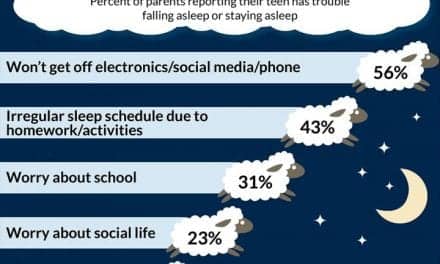More than four in 10 (41%) of young adults say they misuse or abuse prescription stimulants to stay awake, according to a nationally representative survey released Thursday by the Partnership for Drug-Free Kids. The online study found that young adults often misuse and abuse Rx stimulants as a way to manage the daily demands of academics, work, and social pressures.
The new research found that one in five college students (20%) report abusing prescription stimulants at least once in their lifetime, compared to one in seven nonstudents (15%). Older students are also more prone to engage in these behaviors: the data found that among current students, sophomores, juniors, seniors, and graduate students are significantly more likely to abuse Rx stimulants than college freshmen.
Among young adults between the ages of 18 and 25, one in six (17%) has abused a prescription stimulant at least once in their lifetime. Overall, young adults are most likely to abuse the prescribed stimulants Adderall (60%), Ritalin (20%), and Vyvanse (14%), which are prescribed for attention deficit hyperactivity disorder (ADHD).
The new study found that young adults generally misuse and abuse prescription stimulants for functional reasons:
- Half of all young adults surveyed (50%) report abusing Rx stimulants to study or improve academic performance
- More than four in 10 (41%) say they misuse or abuse them to stay awake
- Almost one-fourth (24%) misuse or abuse Rx stimulants to improve work performance at a job
Among current college students specifically:
- More than four in 10 (44%) say they abuse Rx stimulants in order to study and improve academic performance, while 31% say they abuse in order to stay awake
- More than one in five (21%) report abusing Rx stimulants in order to improve work performance at their jobs
- More than a quarter of students (27%) who report abuse of Rx stimulants also hold full-time jobs, in addition to attending school (compared to 12% of those who do not abuse Rx stimulants)
“Students need help in learning how to manage their busy lifestyles effectively,” says Dr Josh Hersh, staff psychiatrist at Miami University, in a release. “Learning time management strategies such as ‘block scheduling’ and ‘syllabus tracking’ can help prevent ‘cramming’–the main reason people look to stimulants at whatever the price. In addition, teaching students with ADHD who are prescribed stimulants about how to properly care for their medication will help address misuse and prevent these drugs from getting into the hands of students who might abuse the meds.”
Of those who said they abuse Rx stimulants, 57% report that the last time they abused, they received the medication from a friend, while 10% report obtaining it from a family member and 6% from a “dealer.”
More than a quarter of young adults (28%) who have been legally prescribed Rx stimulants share their medicine with friends. A large portion of these young adults (52%) also report being pressured by their friends into sharing or selling their Rx stimulants.
“These new data confirm that college students are misusing and abusing Rx stimulants in a misguided effort to manage their lives because they are burning the candle at both ends—feeling the need to perform better and achieve their academic and social goals,” says Steve Pasierb, president and CEO of the Partnership for Drug-Free Kids. “This fact presents an opportunity for parents and healthcare professionals to play a pivotal role in helping students better manage their time and the commitments that are stressing them out. And most importantly, they can and should counsel young people who have been legitimately prescribed medication for ADHD to not compromise their own health by sharing or selling those medications.”
Overall, young adults view the abuse of Rx stimulants as less risky than the abuse of prescription pain relievers, smoking cigarettes, or binge drinking. Those who do not abuse Rx stimulants are also more likely to associate risks in doing so. When compared to their counterparts who abuse Rx stimulants, this group of non-abusing young people is more likely to believe that the abuse of prescription stimulants can endanger one’s health (80%), lead to addiction (79%), or cause an overdose (77%). On the other hand, most of those who do abuse Rx stimulants (73%) agree that the side effect of “not being able to sleep” is a risk associated with abusing prescribed stimulants.
Resources
The Medicine Abuse Project is a national action campaign that aims to prevent half a million teens from abusing medicine over 5 years. The Medicine Abuse Project website includes information about the prevention of prescription drug abuse and over-the-counter cough medicine abuse. It provides tips on how to dispose of medicine and how to safeguard the medicine in your home, as well as resources for parents, healthcare providers, law enforcement/communities, and educators. It also includes a comprehensive prescription drug guide to help parents learn about the drugs that teens are most commonly abusing.
For college students who are looking for ways to balance school, work, and social obligations, New York University offers tips on more effective personal time management.
The Partnership for Drug-Free Kids also offers a toll-free help line at 855-DRUGFREE. It is open Monday through Friday from 10 am to 6 pm EST and offers assistance to parents and other primary caregivers of children who want to talk to someone about their child’s drug use and drinking. Trained parent support specialists provide guidance and help parents lay out an effective course of action to address all drug issues, including medicine abuse.
Survey Methodology
The Partnership for Drug-Free Kids enlisted independent researcher Whitman Insight Strategies (WINS) to field an online survey of 1,621 young adults ages 18 to 25. The survey was fielded from July 22, 2014, through August 3, 2014. Of the 1,621 young adults surveyed, 1,018 were current college students (full or part-time) and 603 were noncollege students. WINS also surveyed a subsample of 406 abusers of Rx stimulants comprised of 256 student abusers and 150 nonstudent abusers. The margins of error for the survey at the 95% confidence level for key audiences are: +/- 2.3% for total adults nationwide, +/- 3.0% for current students, +/- 3.9% for nonstudents, +/- 4.8% for total abusers of Rx stimulants.



